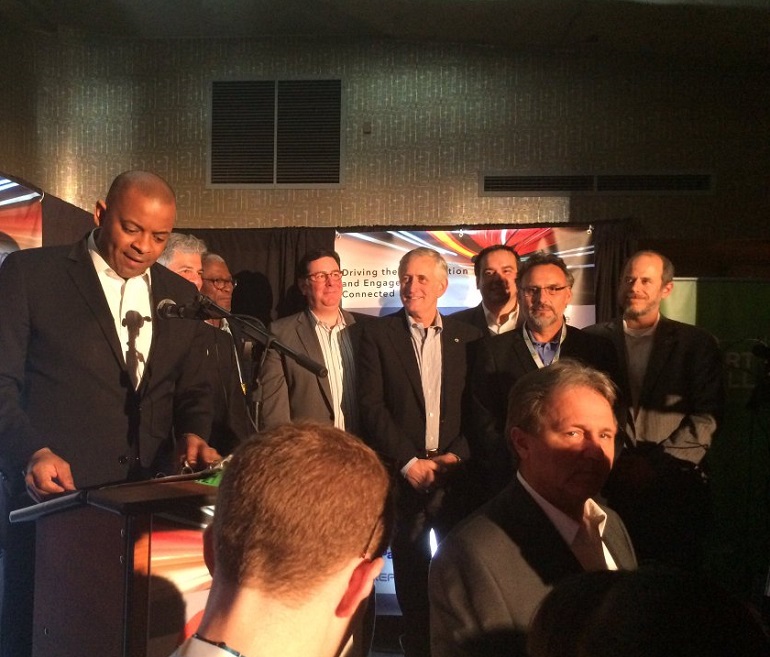In a quickly-changing landscape, San Francisco is taking the future of transportation head-on.
The SFMTA recently formed an Office of Innovation, and SFMTA-led efforts to adapt to emerging innovations like shared mobility services and self-driving cars were recognized today by the US Department of Transportation, which named the agency one of seven finalists in the running for the DOT’s Smart City Challenge grant.
US Transportation Secretary Anthony Foxx announced the "Smart City” grant finalists today at the South by Southwest Festival in Austin, Texas. SFMTA Director of Transportation Ed Reiskin is on the right. Photo: Texas A&M Transportation Institute
The $50 million grant is intended to challenge cities to develop “the most innovative, forward-thinking plan to harness technology and re-imagine how people move,” U.S. Transportation Secretary Anthony Foxx wrote on the US DOT’s blog:
Here at DOT, we're continuing to adapt new technologies and data availability to prepare for the future, innovating in ways that previous generations only imagined as science fiction. We're nurturing connected and autonomous vehicles that practically eliminate crashes. And we're imagining this technology interacting with both wired and wireless infrastructure to eliminate traffic jams as well.
To help meet these technological challenges, the SFMTA formed a small team with technology expertise to lay out a proposal in its Smart City grant application. The application included a process to initiate a Community Mobility Challenge. Under that program, new transportation technologies and shared mobility services would be implemented as pilot programs in at least one city neighborhood selected through an application process.
“In dense, urban cities like San Francisco, we are using technology and innovation to improve our entire transportation network for all users of our roadways today and for generations to come,” said San Francisco Mayor Ed Lee. “The Smart City grant is a tremendous opportunity to invest in the future of public transportation in our city and I thank Secretary Foxx and the Department of Transportation for selecting San Francisco as one of seven Smart City grant finalists nationwide. San Francisco is the innovation capital of the world and I look forward to working with all of our partners to develop new ideas for new investments as part of this program.”
“As people are getting around in new ways that were once hard to imagine, our cities are on the front lines of change,” said SFMTA Director of Transportation Ed Reiskin. “The Smart City challenge has driven our cities to think ahead of the curve so that we can ensure that innovations help make our cities safer, more accessible, affordable and environmentally sustainable. This support and recognition from the US Department of Transportation is an honor for San Francisco and our peer cities who are paving the way for smart mobility innovations to improve quality of life.”
"We thank the US Department of Transportation for this recognition and are delighted to partner with SFMTA to showcase San Francisco's ideas to advance the Smart Cities program," said SF County Transportation Authority Executive Director Tilly Chang.
